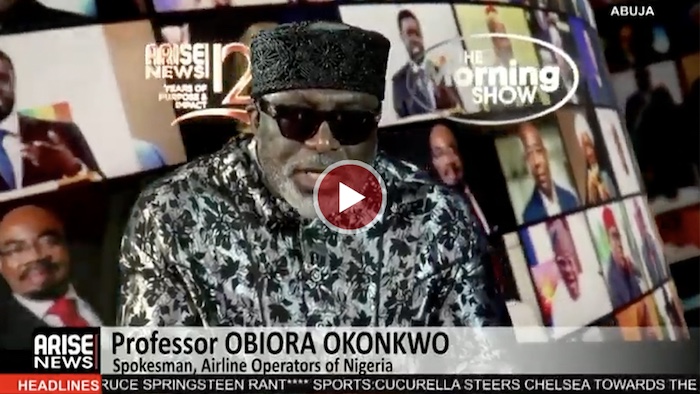United Nigeria Airlines Chairman Okonkwo: ‘We Pay More to Regulators Than We Earn’

The Chairman of United Nigeria Airlines, Professor Obiora Okonkwo, has raised concerns over the financial hardship facing domestic airlines in Nigeria, warning that some operators are now paying more in regulatory charges than they are making in revenue.
Speaking during an interview on ARISE News on Sunday, Okonkwo described the industry as being in a “financially unviable” state due to excessive regulatory fees, high insurance premiums, operational limitations, and inadequate government support.
“We pay more money to regulatory agencies than we take home as revenue,” Okonkwo stated during the interview. “If you check what an average airline pays monthly to the Nigerian Civil Aviation Authority, NCAA, and the Federal Airports Authority of Nigeria, FAAN, you will be shocked. What we pay is in billions. No other place in the world does that happen.”
He warned that unless these issues are urgently addressed, the aviation sector could face deeper instability. “This is a fact, and if we don’t speak to these facts, nobody will know what is happening. Airlines are overburdened with costs.”
Citing industry-wide challenges, Okonkwo, who is also the spokesperson for the Airline Operators of Nigeria (AON), pointed to the soaring cost of insurance as a key example of the financial pressure.
“We pay five times more to insure an aircraft here than anywhere else in the world, and we don’t get paid five times more for tickets,” he said. While commending recent regulatory reforms—particularly the Nigerian Council of Registered Insurance Brokers (NICOM)’s revised guidelines aimed at easing aircraft leasing—he stressed that such steps, though welcome, would not translate into cheaper fares for passengers any time soon.
“NICOM reviewed those guidelines and came up with something that is very positive. That’s a major reform. That will open the skies for us. But does that translate into cheaper tickets? The answer is no. Not immediately.”
Addressing passenger complaints over delays, cancellations, and rising ticket prices, Okonkwo explained that Nigerian carriers are hampered by operational constraints that are often out of their control. These include poor weather conditions, inadequate airport infrastructure, and limited runway hours.
“An aircraft has to operate 18 schedules a day to be viable. But we are constrained to work within 12 hours. If you have a delay in the morning due to weather or whatever, the entire operation for the day is affected.”
He also addressed criticisms of airline service quality, noting the efforts made by staff under difficult conditions.
“We try our best. Some of our people have been beaten up at the airport. That doesn’t happen anywhere else in the world. But we keep trying our best. We provide refreshments. We go on the flight to apologise. We engage the passengers. We even allow them to abuse us.”
The United Nigeria Airlines chairman also used the opportunity to recall a recent near-miss incident at Asaba Airport involving an antelope that ran across the runway.
“We had an incident in Asaba where we had a runway incursion. An antelope, a very huge animal, crossed the runway while we were landing. It took divine intervention for us to avoid a crash,” he said, emphasizing that the incident was a major safety concern.
“What happened at Asaba was a miracle. If it were a smaller aircraft, it would have been a crash. The aircraft would have gone off the runway. There would have been fire. We give thanks to God for intervening. But we also need to hear from FAAN what they are doing to prevent future occurrence—not just press statements. Are we fencing our airports? What’s happening with foreign object debris?”
Despite the uphill battles, Okonkwo acknowledged the resilience of domestic operators.
“We’ve been in operation for five years. In an environment like this, that’s a miracle,” he said. However, he stressed that survival alone is not enough. Okonkwo called for urgent reforms, especially in the area of financial support and infrastructure development, to ensure the long-term viability of Nigeria’s aviation sector.
“Airlines are struggling to keep their aircraft in the air. That’s the simple truth.”
